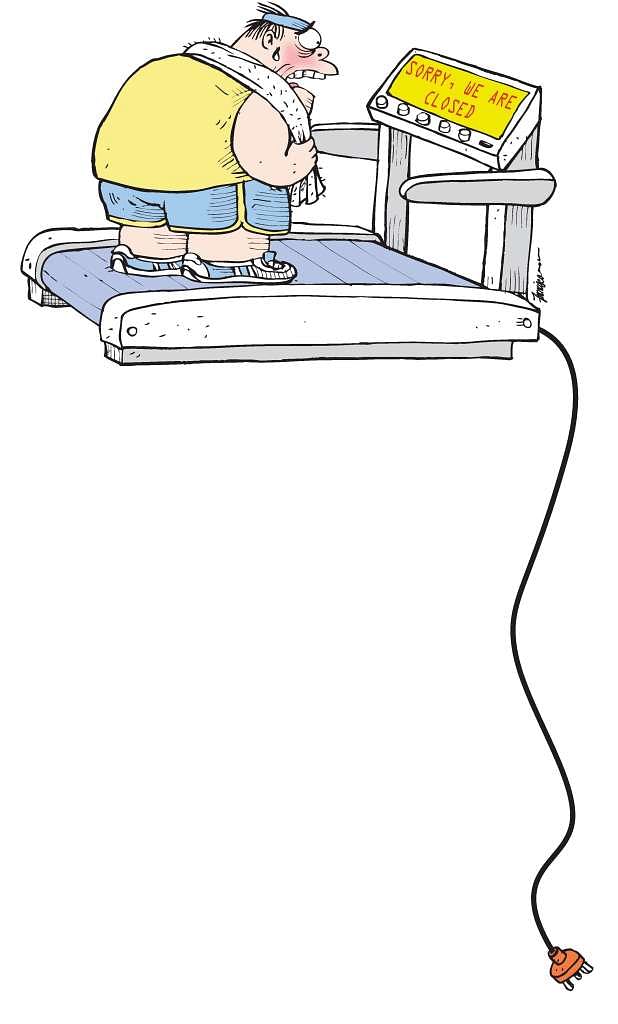It is a tale that has grown too familiar. A business sells prepaid packages for products or services at discounted rates. Hundreds of consumers snap them up.
Then the firm shuts down, leaving its customers stranded with unused packages that can amount to thousands of dollars.
This has happened with hair salons, travel agencies, bridal studios, nail salons and spa chains.
And it hits not just small single-outlet firms but also large reputable ones, like gym chain California Fitness, the latest casualty.
One thing the businesses have in common? They collect money up front for packages meant to be consumed over a period of time.
These can be one-year or three-year memberships or - as in the case of California Fitness, which shut all its outlets in July - even lifetime memberships.

Each time a firm folds out of the blue, consumers kick up a fuss and the Consumers Association of Singapore (Case) receives a deluge of complaints. But many consumers find it tough to get their money back.
WHY REFUNDS ARE HARD TO GET
Even if the closed firm has any assets left that can be sold, consumers are considered unsecured creditors, which means they are lower in the queue to get any money owed to them.
Any assets the business has will go towards paying landlords, the tax authorities or the employees before they go towards refunding customers, said lawyer Amolat Singh.
Under the Companies Act, the shareholders of private limited firms - which most prepayment businesses are - have limited liability and cannot be sued directly for company debts.
In many cases, the business are reported to have sold packages just days before they closed. But it can be difficult to prove whether a firm intended to cheat customers, or simply failed as a business. The police will step in only if it is a case of criminal fraud.
WHAT HAS BEEN DONE TO HELP CONSUMERS
Sudden closures have hit newspaper headlines for years.
Failed businesses include nail salon Wax in the City in 2010, travel agency Five Stars Tours in January 2014 and hair salon chain The Scissorhands and its affiliate Shizahanzu in August last year.
What can customers do to protect themselves? The obvious answer would be to avoid buying prepaid packages altogether, and pay only after each use.
But to skip these packages entirely because of a few black sheep would be a shame, since a package deal tends to come with discounts.
Still, there are ways consumers can protect themselves, such as purchasing insurance against a firm's sudden closure, or buying from firms that protect prepayments.
The authorities have also stepped in to help.
Last year, the Singapore Tourism Board added a licensing condition requiring travel agents to remind customers to buy insurance against agent insolvency.
Case has partnered several industry associations to come up with accreditation schemes that certify a business as honest and fair - by ensuring they have some sort of protection for prepayments, among other conditions.
Consumers can choose to buy spa or renovation packages from only accredited firms. To be accredited, spas offering prepaid packages have to either insure customers against sudden closure or protect the money in an escrow fund.
In the case of the latter, the money paid will go into a fund managed by smart-card system operator EZ-Link, and will be dispensed to the participating beauty company each time a spa session is redeemed.
Should the spa operator go bust, EZ-Link will return the unused funds to the customer.
In another scheme for renovation businesses, firms must offer a deposit performance bond that covers customers' deposits if the contractor leaves work unfinished and goes bust or is uncontactable for 30 days.
Case will be introducing similar schemes to protect prepayments to hair salons and school-bus operators. Accredited businesses can be found on the CaseTrust website.
WHAT MORE CAN BE DONE
Case's accreditation schemes, however, have their limits.
Their reach is not wide enough.
Of the estimated 20,000 spa and beauty salons nationwide, only 640 are accredited, for example.
The challenge is that, ultimately, the schemes are voluntary, noted Case executive director Seah Seng Choon.
Will consumers travel a long way from home just to have their regular beauty treatments at an accredited salon? Unlikely.
So, even if the current schemes are eventually extended to gyms and fitness chains - they are not covered yet - these issues do not seem to be going away any time soon.
Case has been pushing for the law to be amended to make it unlawful for firms to collect prepayments without offering consumers some protection in return.
In the wake of California Fitness' closure, Straits Times readers have suggested banning packages altogether or tightening the rules for businesses that collect upfront payments, such as requiring them to obtain a separate licence.
The Ministry of Trade and Industry (MTI) said mandating requirements across the board "could impose onerous compliance and administrative costs, which may be passed on to consumers".
Other countries and territories, such as Australia and Hong Kong, also do not impose broad-based requirements for prepayments to be protected, MTI's corporate communications director Cindy Keng noted in a letter to the ST Forum Page published on Aug 1.
But Mr Seah thinks the cost on businesses would be marginal.
"Many of the industries are using the funds prepaid by consumers to run their cash flow and place their businesses' risk on consumers' shoulders," he added.
"And when a business goes belly up, like in the case of California Fitness, consumers end up bearing all the losses."
WHAT MORE CONSUMERS CAN DO
But should the authorities even step in in the first place, when the issue involves something as unpredictable as the success of a business?
Besides, services like gym sessions and beauty treatments are not "must-haves" or so crucial that the law must respond with safeguards, said Mr Singh.
He added: "The law does not always have an answer or solution because there is a balancing of competing interests such as the ease of doing business, a business-friendly environment, encouraging entrepreneurship (and so on), against protection for consumers."
Consumers should be aware that there is an inherent risk involved when they pay up front for a package, no matter how reputable the company is.
They can mitigate the risk by finding out how the company is faring before taking the plunge, and not be lured simply by a cheap deal.
They can check the company's accounts through the Accounting and Corporate Regulatory Authority, or read reviews on Internet forums.
They can prioritise buying only from CaseTrust-accredited firms.
This way, more firms will be encouraged to join the schemes.
There is also an option offered by credit card companies known as a chargeback, which allows customers to get their money back if there is non-delivery of service.
While this is an option consumers could consider to limit lost prepayments, it is not available to those who make purchases with an instalment payment plan.
Also, getting money back through a chargeback may not be so simple as other factors, such as the consumer having supporting documents, need to be considered.
So, before signing a contract for a package, consumers should check what payment plan they will be on, and ask the merchant "What happens if I terminate the contract?" and "What happens if your business fails?", so they are aware of the risks they are taking.
Ultimately, consumers have a choice when it comes to buying prepaid packages. They should make a wise and informed decision, and not fork out an amount up front that they cannot afford to lose.


